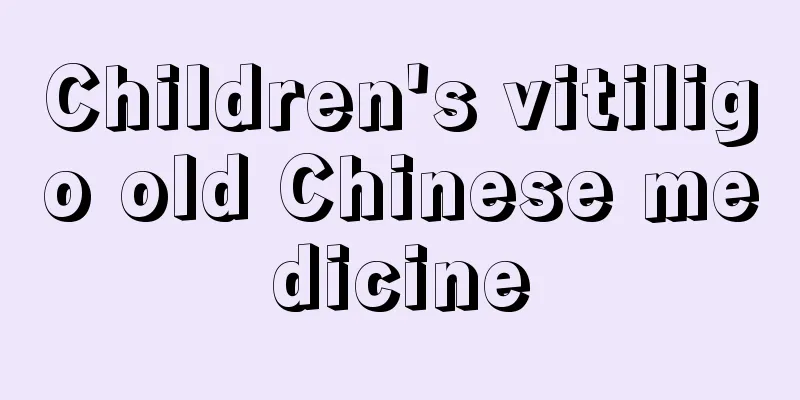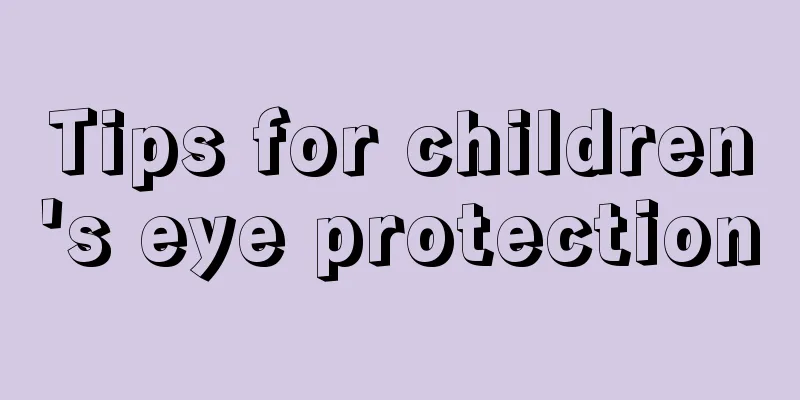Children's vitiligo old Chinese medicine

|
Vitiligo is a very common disease in our lives. It is mainly divided into two types: congenital hereditary and acquired development. Many children's vitiligo problems are caused by congenital reasons. There are two common treatments in society. One is Chinese medicine and the other is Western medicine. Chinese medicine is adopted by many people, and Chinese medicine has a very clear division of the causes of vitiligo, and has different treatments and solutions for them. Here are some specific explanations for them, I hope it will be effective for you. What are the specific types of vitiligo in traditional Chinese medicine? 1. Qi and blood disharmony type. The local manifestations are pale white spots with blurred edges and slow development. The patient is generally weak, pale, cold hands and feet, and has a thin pulse. Medicinal herbs such as Tribulus terrestris, Millettia reticulata, Saposhnikovia divaricata, Rehmannia root, Paeonia lactiflora, and Salvia miltiorrhiza are used to harmonize Qi and blood, dispel wind and expel evil spirits. 2. Liver depression and qi stagnation type. The white spots have no fixed predilection site, the lesions develop slowly, and the color is sometimes light and sometimes dark. It is more common in women. The condition often worsens with emotional changes, and is often accompanied by chest and flank distension, irritable personality, thin white tongue coating, and weak pulse. You can use angelica, white peony, curcuma, tribulus terrestris, motherwort, Xanthium sibiricum, etc. to soothe the liver and relieve depression, promote blood circulation and dispel wind. 3. Meridian blockage type. The white spots are relatively localized, often asymmetrical, with clear borders, the hair inside the spots turns white, the development is slow, and the tongue and veins are dilated. Use salvia miltiorrhiza, peach kernel, safflower, Millettia reticulata, red peony root, Chuanxiong, duckweed, and angelica to promote blood circulation, remove blood stasis, and dispel wind and dredge the meridians. 4. Damp-heat type. It manifests as pink white spots with clear borders. The onset is sudden and the patches expand and spread rapidly. It is more common on the face. During the onset period, there will be itching in that area. The patient may feel drowsiness in the limbs, dizziness and weakness, greasy tongue coating, and slippery pulse. You can choose honeysuckle vine, white peony root, red peony root, angelica, Poria cocos, gentian, etc. to clear away heat and dampness, promote blood circulation and dispel wind. 5. Liver and kidney deficiency type. The symptoms are clear boundaries of white spots, local hair turning white, long course of disease, dizziness, tinnitus, back pain, and light red tongue coating. Commonly used herbs include raw Rehmannia root, cooked Rehmannia root, Polygonum multiflorum, red peony root, white peony root, etc. to nourish the liver and kidney, nourish blood and dispel wind. |
<<: The child wets the bed at night and doesn't wake up
>>: Is it normal for a 5 and a half year old to lose teeth?
Recommend
Children feel inferior when their parents are not around
In recent years, there have been many left-behind...
Treatment of fever rash in babies
Nowadays, it is not uncommon for babies to develo...
What are the dangers of rabies vaccination for children?
Rabies vaccine is an antibody that is usually inj...
Symptoms of viral fever in children
Children's resistance is relatively weak, so ...
When is the best time to correct a child's crooked teeth?
Nowadays, most of the children born in the 2000s ...
Can children eat blueberries?
Blueberries have high nutritional value and are r...
Can children soak their feet? What are the benefits?
The cold winter is coming soon. Many elderly frie...
How to treat wheezing pneumonia in children?
Because people don’t know enough about pneumonia,...
Benefits of bathing your baby
In daily life, people often take a bath to soothe...
What causes a child to vomit after eating?
Children's stomachs are relatively fragile, s...
Rash on child's face
It is the hot summer now. The most likely reason ...
Home care for infants with asthmatic bronchitis
It is said that children are the future and hope ...
What are the symptoms of precocious puberty in children?
Parents are increasingly worried about children n...
Treatment of red spots in newborns
Summer is coming soon, and many newborns will alw...
What should I do if my baby has a bad stomach?
Babies have poor gastrointestinal function and of...









